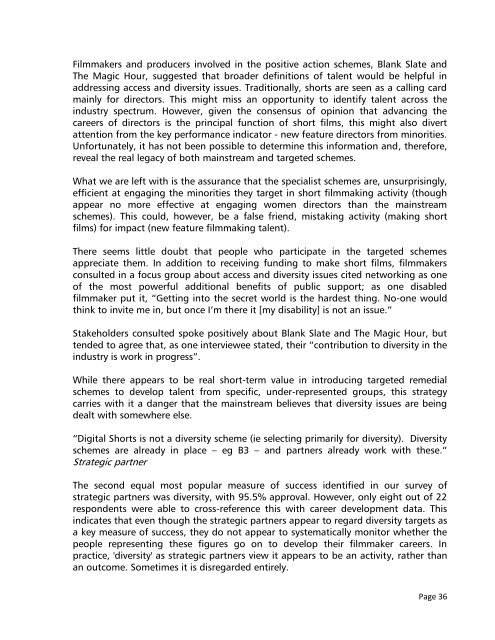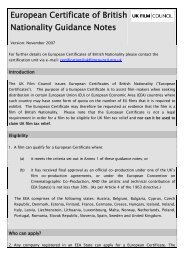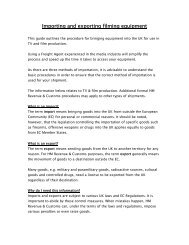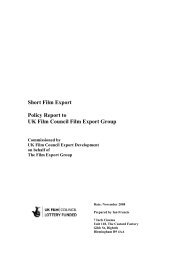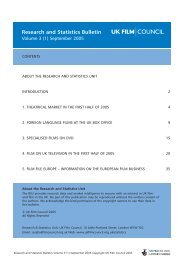Northern Alliance - BFI
Northern Alliance - BFI
Northern Alliance - BFI
You also want an ePaper? Increase the reach of your titles
YUMPU automatically turns print PDFs into web optimized ePapers that Google loves.
Filmmakers and producers involved in the positive action schemes, Blank Slate and<br />
The Magic Hour, suggested that broader definitions of talent would be helpful in<br />
addressing access and diversity issues. Traditionally, shorts are seen as a calling card<br />
mainly for directors. This might miss an opportunity to identify talent across the<br />
industry spectrum. However, given the consensus of opinion that advancing the<br />
careers of directors is the principal function of short films, this might also divert<br />
attention from the key performance indicator - new feature directors from minorities.<br />
Unfortunately, it has not been possible to determine this information and, therefore,<br />
reveal the real legacy of both mainstream and targeted schemes.<br />
What we are left with is the assurance that the specialist schemes are, unsurprisingly,<br />
efficient at engaging the minorities they target in short filmmaking activity (though<br />
appear no more effective at engaging women directors than the mainstream<br />
schemes). This could, however, be a false friend, mistaking activity (making short<br />
films) for impact (new feature filmmaking talent).<br />
There seems little doubt that people who participate in the targeted schemes<br />
appreciate them. In addition to receiving funding to make short films, filmmakers<br />
consulted in a focus group about access and diversity issues cited networking as one<br />
of the most powerful additional benefits of public support; as one disabled<br />
filmmaker put it, “Getting into the secret world is the hardest thing. No-one would<br />
think to invite me in, but once I‟m there it [my disability] is not an issue.”<br />
Stakeholders consulted spoke positively about Blank Slate and The Magic Hour, but<br />
tended to agree that, as one interviewee stated, their “contribution to diversity in the<br />
industry is work in progress”.<br />
While there appears to be real short-term value in introducing targeted remedial<br />
schemes to develop talent from specific, under-represented groups, this strategy<br />
carries with it a danger that the mainstream believes that diversity issues are being<br />
dealt with somewhere else.<br />
“Digital Shorts is not a diversity scheme (ie selecting primarily for diversity). Diversity<br />
schemes are already in place – eg B3 – and partners already work with these.”<br />
Strategic partner<br />
The second equal most popular measure of success identified in our survey of<br />
strategic partners was diversity, with 95.5% approval. However, only eight out of 22<br />
respondents were able to cross-reference this with career development data. This<br />
indicates that even though the strategic partners appear to regard diversity targets as<br />
a key measure of success, they do not appear to systematically monitor whether the<br />
people representing these figures go on to develop their filmmaker careers. In<br />
practice, 'diversity' as strategic partners view it appears to be an activity, rather than<br />
an outcome. Sometimes it is disregarded entirely.<br />
Page 36


